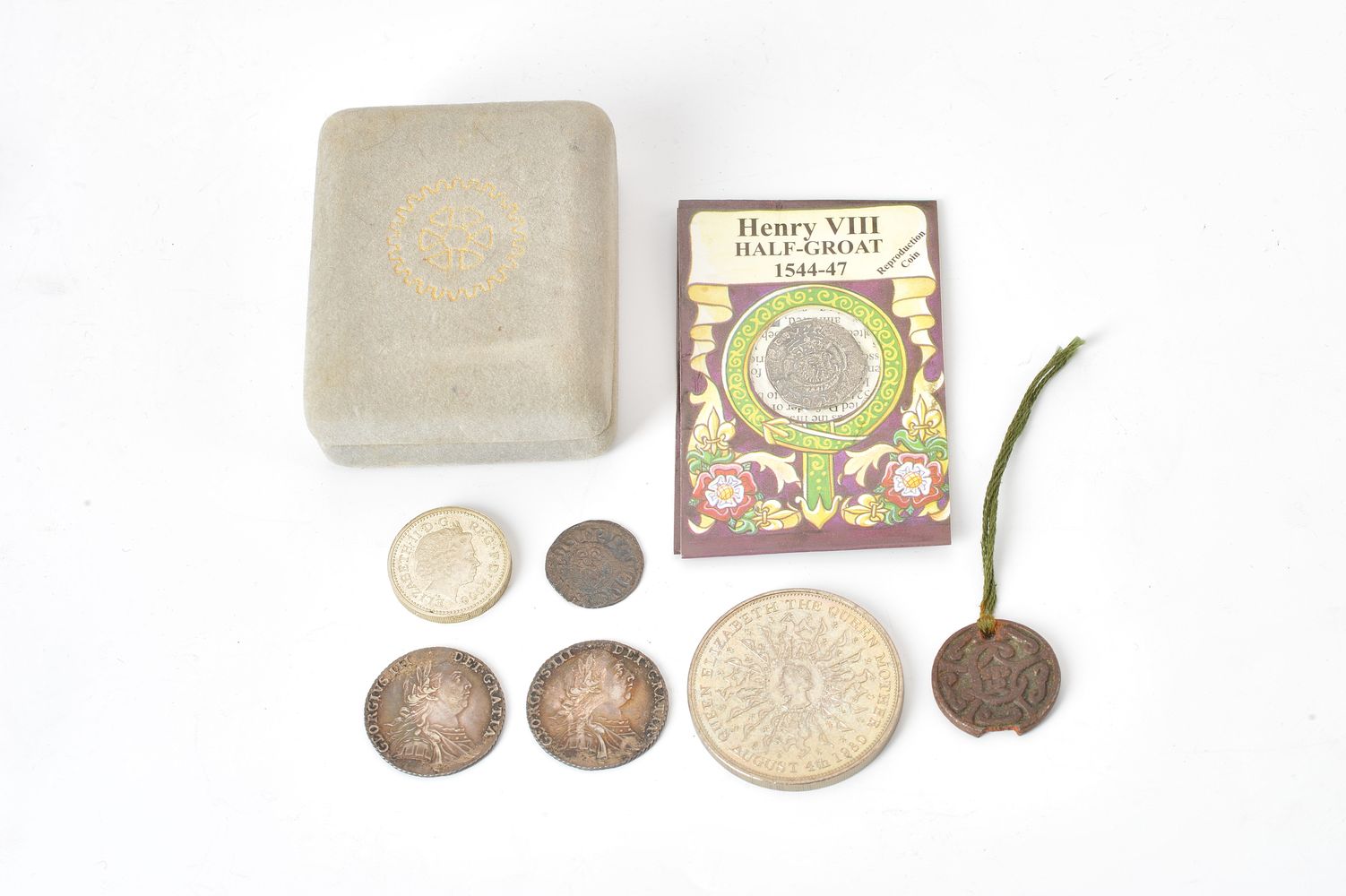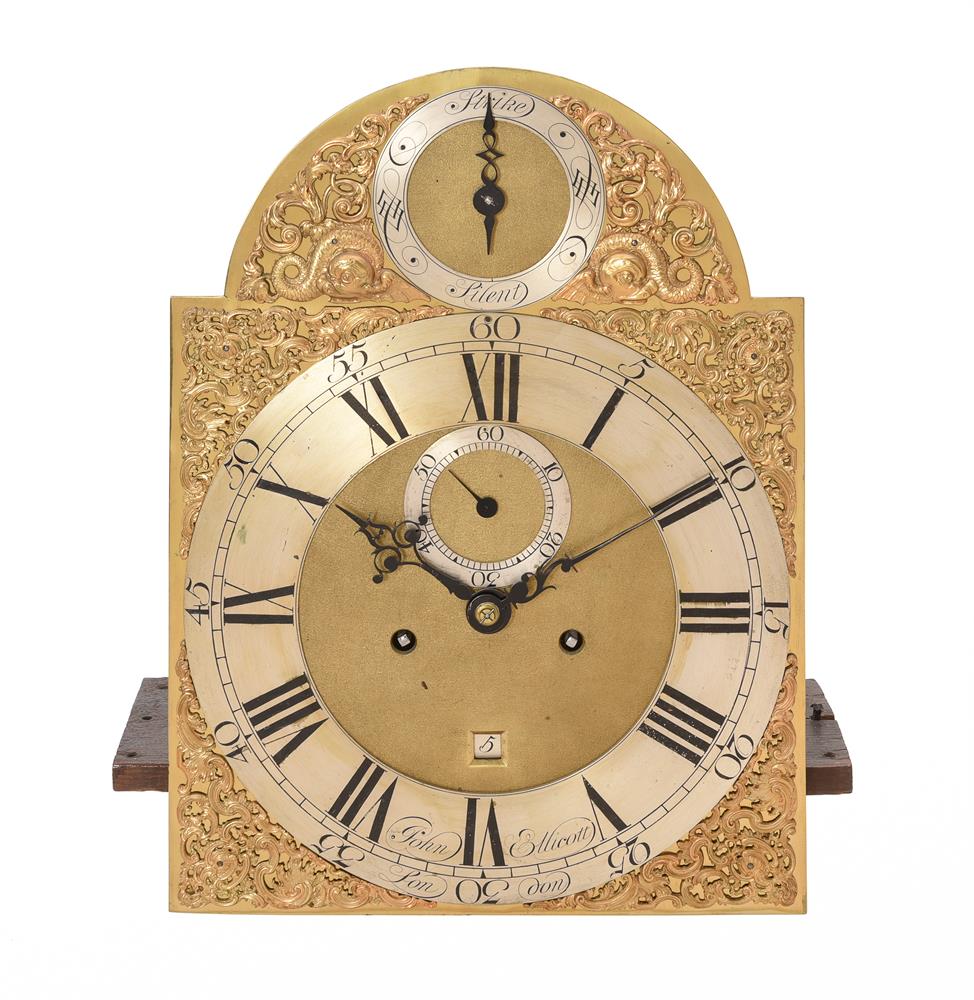A FINE GEORGE III GOLD PAIR-CASED POCKET WATCH WITH CYLINDER ESCAPEMENT Thomas Mudge and William Dutton, hallmarked London 1781 The gilt full plate single fusee movement with four square section baluster pillars pinned through the backplate, scroll-pierced stop-iron block and cylinder escapement regulated by sprung three-arm steel balance with Tompion type regulation, the backplate with fine asymmetric foliate scroll pierced and engraved balance cock with herringbone bordered rim and grotesque mask at the junction with wedge-shaped relief engraved foot flanked by silvered regulation disc set within adjacent applied scroll engraved panel infill opposing signature Tho's Mudge, W. Dutton, London and numbered 1207, with gilt brass dust cover similarly signed Tho's Mudge, W. Dutton, London and slightly convex white enamel Roman numeral dial incorporating Arabic five minutes to outer track and with gold beetle and poker hands, the gold inner case applied with suspension post and ring at twelve o'clock and fitted with convex glass to bezel, the conforming outer case engraved with an oval cartouche enclosing armorial of a fist grasping a crescent over initials R H, both cases marked for London 1781 maker I T P for John Terrill Pain of Fetter Lane, London. The pillar plate 3.8cm (1.5ins approx.) diameter; the outer case 5cm (2ins) diameter. Provenance: Supplied new in 1781 to R. Hibbert (believed to be Robert) thence by direct family descent to the present owner. The crest engraved to the rear of the watch is recorded in Fairbairn's Book of Crests (1905) as belonging to the Hibbert family, Chorley, Lancashire and is described 'A Dexter Cubit Arm Erect, Vested Az., Cuffed Erm., Holding In The Hand Ppr. A Crescent Arg.'. Thomas Mudge was born in Exeter, Devon in 1717 and was apprenticed to George Graham before setting himself up in business at 151 Fleet Street, London in 1748. At around the time of the death of his former Master in 1751, Mudge was joined in partnership by a fellow former apprentice of Graham, William Dutton, who is recorded in Baillie, G.H. Watchmakers & Clockmakers of the World as apprenticed in 1738 and gaining his freedom of the Clockmakers' Company in 1746.The business subsequently traded from 148 Fleet Street and Mudge, whilst in partnership with Dutton, rapidly acquired a reputation as one of England's outstanding watchmakers. In around 1755, if not earlier, Mudge invented the detached lever escapement, which he first applied to a clock, but when incorporated into a watch became the greatest single improvement ever applied to them.In 1765 Mudge published the book, Thoughts on the Means of Improving Watches, Particularly those for Use at Sea, and the following year, alongside Dutton, was elevated to Liveryman. In around 1771 Thomas Mudge retired to Plymouth in order to spend more time to pursue his development of a marine timekeeper. The first of these went on trial in 1774 where it performed superbly leading to an award of 500 guineas. Mudge went on to complete two others in 1779 in the continuing attempt to satisfy the increasingly difficult requirements set by the Board of Longitude. They were tested by the Astronomer Royal, Nevil Maskelyne, and declared as being unsatisfactory. There followed a controversy in which it was claimed that Maskelyne had not given them a fair trial. A similar controversy had arisen when John Harrison had been denied the full amount of the 1714 prize by the Board of Longitude. Eventually, in 1792, two years before his death, Mudge was awarded £2,500 by a Committee of the House of Commons who decided for Mudge and against the Board of Longitude, then headed by Sir Joseph Banks.In around 1775 Dutton took both his sons (Thomas and Matthew) into the business forming a second partnership of William Dutton and Sons however the name Mudge and Dutton was often still used (mainly for watches) up to around 1790. William Dutton died in 1794 leaving the business to be continued very much in his tr
A FINE GEORGE III GOLD PAIR-CASED POCKET WATCH WITH CYLINDER ESCAPEMENT Thomas Mudge and William Dutton, hallmarked London 1781 The gilt full plate single fusee movement with four square section baluster pillars pinned through the backplate, scroll-pierced stop-iron block and cylinder escapement regulated by sprung three-arm steel balance with Tompion type regulation, the backplate with fine asymmetric foliate scroll pierced and engraved balance cock with herringbone bordered rim and grotesque mask at the junction with wedge-shaped relief engraved foot flanked by silvered regulation disc set within adjacent applied scroll engraved panel infill opposing signature Tho's Mudge, W. Dutton, London and numbered 1207, with gilt brass dust cover similarly signed Tho's Mudge, W. Dutton, London and slightly convex white enamel Roman numeral dial incorporating Arabic five minutes to outer track and with gold beetle and poker hands, the gold inner case applied with suspension post and ring at twelve o'clock and fitted with convex glass to bezel, the conforming outer case engraved with an oval cartouche enclosing armorial of a fist grasping a crescent over initials R H, both cases marked for London 1781 maker I T P for John Terrill Pain of Fetter Lane, London. The pillar plate 3.8cm (1.5ins approx.) diameter; the outer case 5cm (2ins) diameter. Provenance: Supplied new in 1781 to R. Hibbert (believed to be Robert) thence by direct family descent to the present owner. The crest engraved to the rear of the watch is recorded in Fairbairn's Book of Crests (1905) as belonging to the Hibbert family, Chorley, Lancashire and is described 'A Dexter Cubit Arm Erect, Vested Az., Cuffed Erm., Holding In The Hand Ppr. A Crescent Arg.'. Thomas Mudge was born in Exeter, Devon in 1717 and was apprenticed to George Graham before setting himself up in business at 151 Fleet Street, London in 1748. At around the time of the death of his former Master in 1751, Mudge was joined in partnership by a fellow former apprentice of Graham, William Dutton, who is recorded in Baillie, G.H. Watchmakers & Clockmakers of the World as apprenticed in 1738 and gaining his freedom of the Clockmakers' Company in 1746.The business subsequently traded from 148 Fleet Street and Mudge, whilst in partnership with Dutton, rapidly acquired a reputation as one of England's outstanding watchmakers. In around 1755, if not earlier, Mudge invented the detached lever escapement, which he first applied to a clock, but when incorporated into a watch became the greatest single improvement ever applied to them.In 1765 Mudge published the book, Thoughts on the Means of Improving Watches, Particularly those for Use at Sea, and the following year, alongside Dutton, was elevated to Liveryman. In around 1771 Thomas Mudge retired to Plymouth in order to spend more time to pursue his development of a marine timekeeper. The first of these went on trial in 1774 where it performed superbly leading to an award of 500 guineas. Mudge went on to complete two others in 1779 in the continuing attempt to satisfy the increasingly difficult requirements set by the Board of Longitude. They were tested by the Astronomer Royal, Nevil Maskelyne, and declared as being unsatisfactory. There followed a controversy in which it was claimed that Maskelyne had not given them a fair trial. A similar controversy had arisen when John Harrison had been denied the full amount of the 1714 prize by the Board of Longitude. Eventually, in 1792, two years before his death, Mudge was awarded £2,500 by a Committee of the House of Commons who decided for Mudge and against the Board of Longitude, then headed by Sir Joseph Banks.In around 1775 Dutton took both his sons (Thomas and Matthew) into the business forming a second partnership of William Dutton and Sons however the name Mudge and Dutton was often still used (mainly for watches) up to around 1790. William Dutton died in 1794 leaving the business to be continued very much in his tr















Try LotSearch and its premium features for 7 days - without any costs!
Be notified automatically about new items in upcoming auctions.
Create an alert